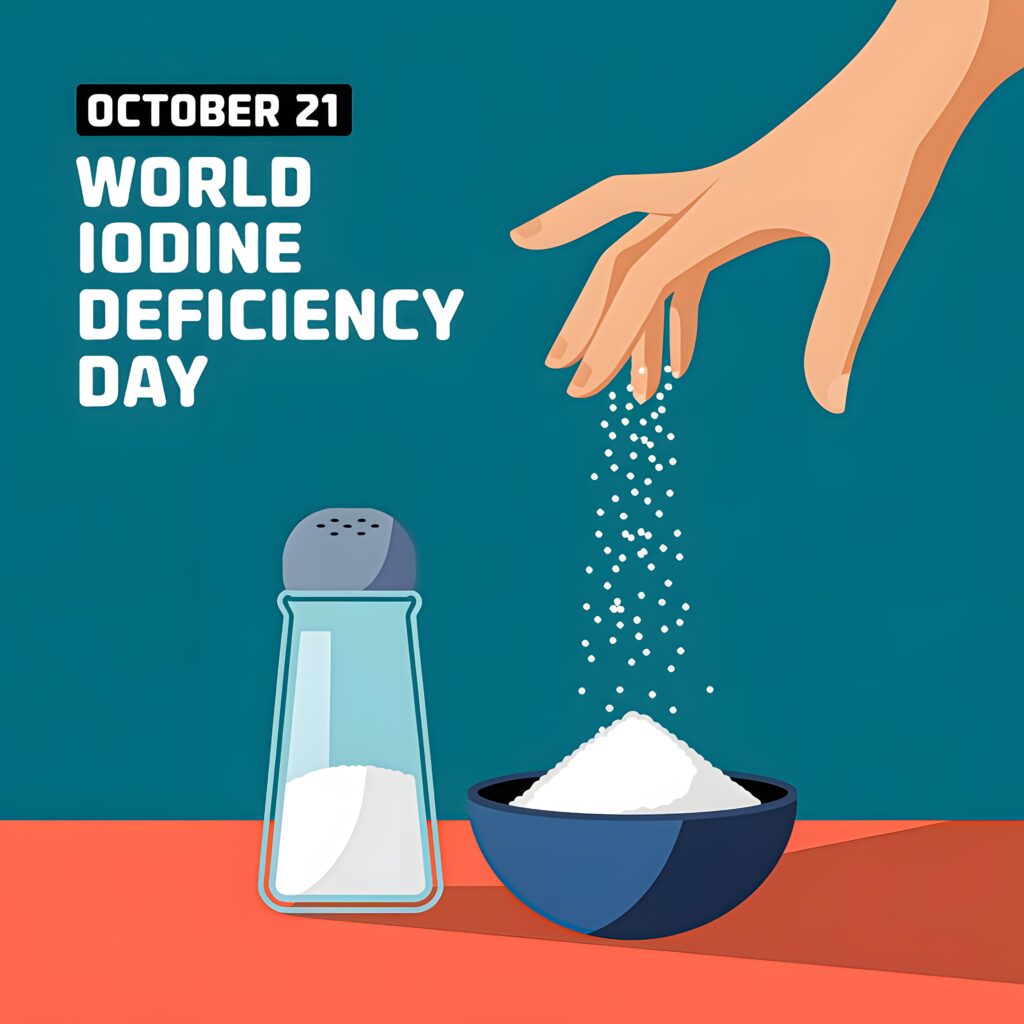
World Iodine Deficiency Day, observed on October 21, aims to raise global awareness about iodine deficiency and its impact on health. Iodine is an essential micronutrient that plays a critical role in thyroid function, metabolism, brain development, and overall health. Despite being preventable, iodine deficiency remains a major public health issue worldwide, affecting millions of people, particularly in regions where iodine levels in the soil are low.
Iodine is necessary for the production of thyroid hormones, which regulate growth, metabolism, and brain development, especially in pregnant women and young children. When the body doesn’t get enough iodine, it can lead to a variety of health problems, most notably goiter—an enlarged thyroid gland—and other thyroid disorders.
The major consequences of iodine deficiency include:
Iodine deficiency remains a global problem, affecting around 2 billion people worldwide, according to the World Health Organization (WHO). Even in regions with salt iodization programs, iodine deficiency can persist due to poor diet, lack of awareness, or improper iodization.
Some common symptoms of iodine deficiency include:
The most effective way to treat iodine deficiency is through dietary changes. Increasing iodine intake can be done by consuming foods high in iodine or using iodized salt, which has been fortified with iodine.
Foods rich in iodine include:
Including these foods in your daily diet can help prevent iodine deficiency and maintain normal thyroid function.
The normal iodine level for adults is around 150 micrograms per day, while pregnant and breastfeeding women may require higher amounts (220–290 micrograms) due to the increased demands for fetal brain development and thyroid hormone production.
The most common disease caused by iodine deficiency is goiter, characterized by the enlargement of the thyroid gland. Iodine deficiency can also lead to hypothyroidism, cognitive impairments, and, in severe cases, cretinism (a condition of severe intellectual disability and physical growth delay in children born to mothers with extreme iodine deficiency).
When the body lacks iodine, the thyroid gland cannot produce enough hormones. As a result, the thyroid compensates by enlarging, leading to the development of goiter. This swelling can be visible at the front of the neck and can cause discomfort or difficulty swallowing.
Yes, excessive iodine intake can lead to hyperthyroidism or worsen existing thyroid conditions. Symptoms of too much iodine in the body may include:
To avoid excessive iodine intake, it is important to consume iodine in moderation, especially through supplements.
Iodine plays a role in maintaining healthy skin by regulating thyroid hormones, which control skin cell production. A deficiency can cause dry, flaky skin, while adequate iodine levels contribute to maintaining moisture and skin elasticity.
Thanks to public health initiatives such as the Iodine Deficiency Control Programme, iodized salt is widely available, helping to prevent iodine deficiency in many parts of the world. However, awareness is still key. Make sure your diet includes adequate sources of iodine, and, if you’re unsure about your iodine levels, consult a healthcare professional.
On World Iodine Deficiency Day, take the time to learn about the role of iodine in your health and how you can prevent deficiency. If you suspect you’re not getting enough iodine, consult your doctor for advice on supplementation or dietary changes. By spreading awareness and making simple adjustments to your diet, you can help protect yourself and your family from the consequences of iodine deficiency.

Dr. Radha Palappetty is a specialist in Obstetrics & Gynaecology and has been working in GCC since 1990. Her special interests are in Pregnancy care, Treatment of Polycystic Ovarian Disease, Pregnancy care, Adolescent Gynaecological problems, Infertility management.
WhatsApp us